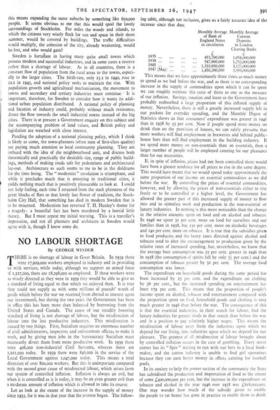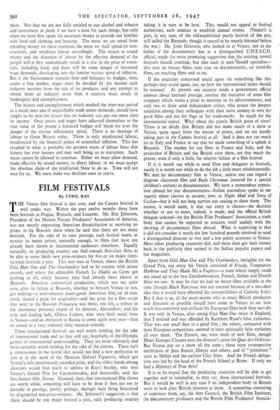NO LABOUR SHORTAGE
By GEORGE WINDER
THERE is no shortage of labour in Great Britain. In 1939 there were 17,929,000 workers employed in industry and in providing us with services, while today, although we support an armed force of 1,327,600, there are 18,298,000 so employed. If these workers were as wisely directed as they were in 1939 they would be able to give us a standard of living equal to that which we enjoyed then. It is true they could not supply us with some millions of pounds' worth of goods which before the war we received, from abroad as interest upon our investments,, but during the two years the Government has been in office this has been more than balanced by borrowing from the United States and Canada. The cause of our steadily lowering standard of living is not shortage of labour, but the misdirection of labour into the less productive industries. This misdirection is caused by two things. First, Socialism requires an enormous number of civil administrators, inspectors and enforcement officers to make it work, and by giving men jobs in the bureaucracy Socialism must necessarily divert them from more productive work. In 1939 there were 408,000 non-industrial Civil Servants, whereas there are 1,011,000 today. In 1939 there were 846,000 in the service of the Local Government against 1,047,000 today. This means a total diversion of over 800,000 workers. But this is unimportant compared with the second great cause of misdirected labour, which arises from our system of controlled inflation. Inflation is always an evil, but when it is controlled as it is today, it may be an even greater evil than a moderate amount of inflation which is allowed to take its course.
Let us look at the extent of the increase in the supply of money since 1935, for it was in that year that the process began. The follow- ing table, although not inclusive, gives us a fairly accurate idea of the increase since that date.
Monthly Average Current Deposits in London Clearing Banks
£
453,700,000 1,054,000,000 547,900,000 1,252,000,000 1,310,800,000 3,127,000,000 1,450,200,000 3,593,000,000
This means that we have approximately three times as much money to spend as we had before the war, and as there is no corresponding increase in the supply of commodities upon which it can be spent we can roughly estimate this ratio of three to one as the measure of our inflation. Savings, taxation and loans to the Government have probably reabsorbed a large proportion of this inflated supply of money. Nevertheless, there is still a greatly increased supply left in our pockets for everyday spending, and the Monthly Digest of Statistics shows us that consumers' expenditure was greater in 1946 than in 1938 by 55 per cent. Now if people spend more money on drink than on the provision of houses, we can safely presume that more workers will find employment in breweries and behind public- house bars than will find employment in the building industry. If we spend more money on non-essentials than on essentials, then a larger number of people will be employed catering for our pleasures than for our necessities.
If, in spite of inflation, prices had not been controlled there would have been a greater tendency for all prices to rise in the same degree. This would have meant that we would spend today approximately the same proportion of our income on essential commodities as we did before the war. By controlling the prices of essential commodities, however, and by allowing the prices of non-essentials either to rise freely or to be controlled at a higher level, the Government has allowed the greater part of this increased supply of money to flow into and to stimulate work and production in the non-essential or luxury industries. In nothing is this more noticeable than the change in the relative amounts spent on food and on alcohol and tobacco. In 1946 we spent 31 per cent. more on food for ourselves and our families than in 1938, but 130 per cent. more on alcoholic beverages and 240 per cent. more on tobacco. It is true that the subsidies gives to food producers and the heavy taxes directed against alcohol and tobacco tend to alter the encouragement to production given by the relative rates of increased spending, but, nevertheless, we know that the average beer consumption was 25 per cent. greater in 1946 than in 1938 (the consumption of spirits fell by only 31- per cent.) and the consumption of tobacco greater by 31 per cent. The average food consumption was lower.
The expenditure on household goods during the same period has been increased by 25 per cent. and the expenditure on clothing by 36 per cent., but the increased spending on entertainment has been 179 per cent. This means that the proportion of people's income spent on alcohol, tobacco and entertainment compared with the proportion spent on food, household goods and clothing is very much greater in 1946 than before the war. The consequence of this is that the essential industries, in their search for labour, find the luxury industries far greater rivals in that search than before the war and in a position to pay relatively higher wages. This means the misdirection of labour away from the industries upon which we depend for our living, into industries upon which we depend for our pleasure. The greatest of all misdirection of labour brought about by controlled inflation occurs in the case of gambling. Every street corner has its " Spiv " waiting to run with our bets to a local book- maker, and the cotton industry is unable to find girl operatives because they can earn better money in offices catering for football pools.
In its anxiety to help the poorer section of the community the State has subsidised the production and importation of food to the extent of some £400,000,000 per year, but the increase in the expenditure on tobacco and alcohol in the year 1946 over 1938 was £818,000,000. One may wonder how much of the subsidy given to enable the people to eat better has gone in practice to -enable them to drink
Monthly Average of Bank of England Notes in circulation
1935 1939 ...
1945 1947 (May) ... more. Not that we are not fully entitled to our alcohol and tobacco and investment in pools if we have a taste for such things, but only when we have first spent the necessary money to provide our families with food and clothing and housing. The more we are saved from spending money on these essentials the more we shall spend on non- essentials, and misdirect labour accordingly. The return to sound money and the direction of labour by the effective demand of the people will at first undoubtedly result in a rise in the price of essen- tials, including food, and there will be some danger of increased wage demands, developing into the familar vicious spiral of inflation. But if the Government remains firm and balances its budget, then, under a free market, wages must be decided by the income each industry receives from the sale of its products, and any attempt to obtain from an industry more than it receives must result in bankruptcy and unemployment.
The misery and unemployment which marked the inter-war period as a result inter alia of unjustifiable trade union demands, should have taught us by now the lesson that no industry can pay out more than its income. Once prices and wages have adjusted themselves to the true value of the pound a balanced budget will break for ever the danger of the vicious inflationary spiral. There is no shortage of labour in Great Britain today. There is only misdirected labour, misdirected by the financial policy of controlled inflation. This has resulted in what is probably the greatest waste of labour force that history has ever known and may well bring us to starvation. Such waste cannot be allowed to continue. Either we must allow demand, made effective by sound money, to direct labour, or we must accept the absolute claim of the totalitarian State to do so. Time will not wait for us. We must make our decision soon or starve.



































 Previous page
Previous page